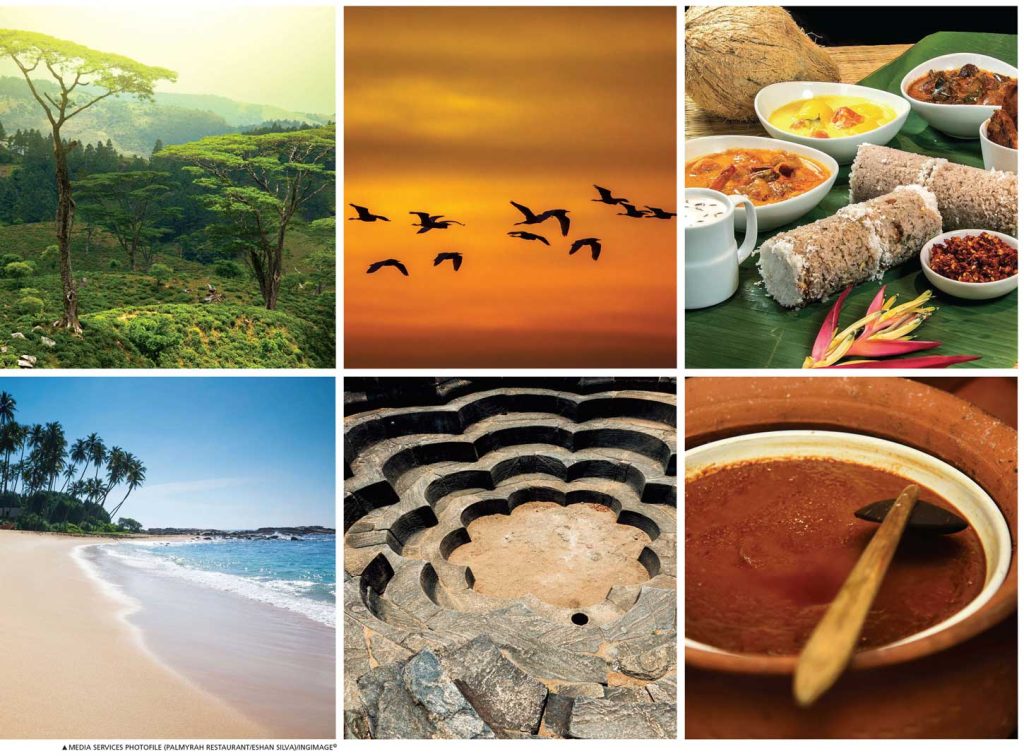THE WAY WE WERE
Wijith DeChickera grows nostalgic – but means business – about reimagining a Sri Lanka rising phoenix-like from its own ashes
On the maps of many travellers through the ages, Ceylon – or Taprobane, or Serendip – was a tear shaped island off the austral waters of India’s womb. Coppery sands, montane vistas and umpteen hinterland treasures held sway.
But in the minds of many Sri Lankans both at home and among our expats residing overseas today, it is much more than a place and possessions – being a heady, rich, often sad, usually glorious, always evocative and hopefully profitable memory.
It is one associated with places – yes, but also the people, encounters and experiences of bygone times. And it’s a moveable feast whose flavours are sealed by a lost, light touch: the myriad fragrances of a mother’s cooking and salty sea breezes still tangy on one’s tongue.
As many moving testimonies penned by those near at hand, as well as scattered to far-flung outposts of our insular dispersion attest, the yearning heart is privileged over any purely logical grey matter in the voyage home… that is to say, towards finding oneself.
As perhaps to be expected, those of us with a pen in hand have the first and last words on the topic…
Writing about his Return to Sri Lanka in the eponymous book of 2019, subtitled Travels in a Paradoxical Island, academic and policy researcher turned returning native Dr. Razeen Sally says of the reintroduction to his motherland: “I had mixed emotions that morning and it took a while to make sense of them.”
He continues: “I still felt a stranger in what used to be home. I kept comparing familiar people and landmarks to what they had looked like in my childhood.”
For islanders in international waters these days, sentimental ‘policy-wonk’ (his term) Sally strikes the right note in any exploration of the relationship between personhood and motherland…
“I became curious about Sri Lanka’s history for the first time. What were the years, decades, centuries and millennia leading up to my childhood like? How did they shape my parents’ Ceylon, my childhood Sri Lanka and [the island nation] in the years of my absence?” he wonders.
Once curiosity starts itching madly, only the scratching of exploration and discovery can restore some sanity. For children of Mother Sri Lanka yearning for a taste of ‘home’ – cooking, cultural round trip or corporate enterprise ‘Connecting Sri Lankans’ – asking the right questions such as Sally’s above is but a first step.
Thinking of one’s erstwhile home with clarity intermingled with fondness can underline the truth that nostalgia isn’t about the way things were… but can be again.
In this respect, ‘Sri Lanka’s worst fisherman’ but also ‘the island’s funniest chronicler’ Andrew Fidel Fernando has a strangely similar sentiment. “On the verge of turning 28…,” he reveals in Upon a Sleepless Isle, published in 2019: “I no longer wished to be a stranger to the delights of my own land. Upon my childhood wonderments, new questions had been layered.”
Nostalgia is a potent tool, as well as a helpful aid to anyone ‘out there’ or ‘over here’ who is interested in refreshing, repositioning and even rebranding Sri Lanka in this – its vital hour
A common skein in the thread of these two narrators’ probing questions is the return to childhood roots to rationalise adult realities and invest them with fresher, deeper meaning – a quest shot through with the kaleidoscopic hues of nostalgia.
For like-minded Sri Lankans eager to explore the infinite possibilities that island life in its phoenix-like resurrection from the ashes of more than mere monetary bankruptcy has this nostalgia woven with an open longing into the very fibre of the being (no matter where in the diaspora they are) may serve well.
Nostalgia is a potent tool, as well as a helpful aid to anyone ‘out there’ or ‘over here’ who is interested in refreshing, repositioning and even rebranding Sri Lanka in this – its vital hour… poised between past penury and future fluidity.
Savvy businesses – from Coke to our own Fountain Café – have used it as a lucrative marketing ingredient to whet consumers’ appetites.
Is Galle Face Green forever to be remembered as the stamping ground of citizen dissent alone? Or – as on the evocative cover of Sri Lanka-born author Romesh Gunesekera’s nostalgia inducing (“I saw it once as a boy – a special beach”) coming of age novel Suncatcher – can it be rebranded as “a place by the sea nearby where lots of small birds come when the sun goes down”?
A place of beauty, peace and plenty – instead of strife and grief!
The key to unlocking this smorgasbord of a refreshingly appetising Sri Lanka may well be nostalgia. Shaken, stirred and sprinkled liberally…

